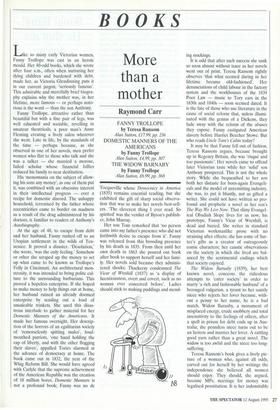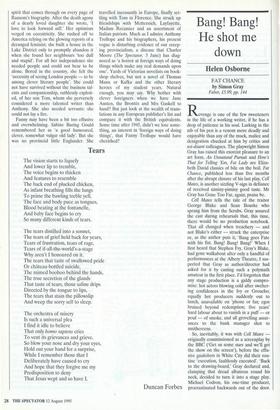BOOKS
More than a mother
Raymond Carr
FANNY TROLLOPE by Teresa Ransom Alan Sutton, £17.99, pp. 236 DOMESTIC MANNERS OF THE AMERICANS by Fanny Trollope Alan Sutton, £4.99, pp. 307 THE WIDOW BARNABY by Fanny Trollope Alan Sutton, £6.99, pp. 368 Like so many early Victorian women, Fanny Trollope was cast in an heroic mould. Her 40-odd books, which she wrote after four a.m., often when nurturing her dying children and burdened with debt, made her, as Victoria Glendinning puts it in our current jargon, 'seriously famous'. This admirable and mercifully brief biogra- phy explains why the mother was, in her lifetime, more famous — or perhaps noto- rious is the word — than the son Anthony.
Fanny Trollope, attractive rather than beautiful but with a fine pair of legs, was well educated and sociable, revelling in amateur theatricals, a poor man's Anne Fleming creating a lively salon wherever she went. Late in life, by the standards of the time — perhaps because, as she observed in one of her novels, men prefer women who flirt to those who talk and she was a talker — she married a morose, failed scholar whose financial follies reduced his family to near destitution.
His 'monomania on the subject of allow- ing his sons any money', as one of them put it, was combined with an obsessive interest in their intellectual progress — ever a recipe for domestic discord. The unhappy household, terrorised by the father whose eccentricities came to border on madness as a result of the drug administered by his doctors, is familiar to readers of Anthony's Autobiography.
At the age of 48, to escape from debt and her husband, Fanny rushed off to an Utopian settlement in the wilds of Ten- nessee. It proved a disaster. 'Desolation,' she wrote, 'was the only feeling.' Somehow or other she scraped up the money to set up what came to be known as Trotlope's Folly in Cincinnati. An architectural mon- strosity, it was intended to bring polite cul- ture to the surrounding barbarians. This proved a hopeless enterprise. If she hoped to make money to help things out at home, her husband ruined an already doomed enterprise by sending out a load of unsaleable trinkets. She used this disas- trous interlude to gather material for her Domestic Manners of the Americans. It made her famous overnight. Her descrip- tion of the horrors of an egalitarian society of 'remorselessly spitting males', loud- mouthed patriots, 'one hand holding the cap of liberty, and with the other flogging their slaves', appalled Tories alarmed at the advance of democracy at home. The book came out in 1832, the year of the Whig Reform Bill. She would have agreed with Carlyle that the supreme achievement of the American Republic was the creation of 18 million bores. Domestic Manners is not a profound book; Fanny was no de Tocqueville whose Democracy in America (1835) remains essential reading, but she exhibited the gift of sharp social observa- tion that was to make her novels best-sell- ers. 'The cleverest thing I ever read. So spirited' was the verdict of Byron's publish- er, John Murray.
Her son Tom remarked that 'no person came into my father's presence who did not forthwith desire to escape from it'. Fanny was released from this brooding presence by his death in 1835. From then until her own death in 1863 she poured out book after book to support herself and her fami- ly. Her novels sold because they adminis- tered shocks: Thackeray condemned The Vicar of Wrexhill (1837) as 'a display of licentiousness, overt and covert, such as no woman ever conceived before'. Ladies should stick to making puddings and mend- ing stockings.
It is odd that after such success she sank so soon almost without trace as her novels went out of print. Teresa Ransom rightly observes 'that what seemed daring in her lifetime became old-fashioned'. Her denunciations of child labour in the factory system and the workhouses of the 1834 Poor Law — music to Tory ears in the 1830s and 1840s — soon seemed dated. It is the fate of those who use literature in the cause of social reform that, unless illumi- nated with the genius of a Dickens, they fade away with the reform of the abuses they expose. Fanny castigated American slavery before Harriet Beecher Stowe. But who reads Uncle Tom's Cabin today?
It may be that Fanny fell out of fashion, Teresa Ransom argues, because brought up in Regency Britain, she was 'risque and too passionate'. Her novels came to offend later Victorian taste while her 'solid' son Anthony prospered. This is not the whole story. While she bequeathed to her son both her distaste for born-again Evangeli- cals and the model of unremitting industry, she was, to put it bluntly, not as gifted a writer. She could not have written so pro- found and prophetic a novel as her son's The Way We Live Now. That slimy Evangel- ical Obadiah Slope lives for us now; his prototype, Fanny's Vicar of Wrexhill, is dead and buried. She writes in standard Victorian workmanlike prose with no straining after effects; she has some of Sur- tee's gifts as a creator of outrageously comic characters; her caustic observations on the society in which she lived are bal- anced by the sentimental endings which that society enjoyed.
The Widow Barnaby (1839), her best known novel, concerns the ridiculous attempts to 'enter society' in order to many 'a rich and fashionable husband' of a berouged vulgarian, a tyrant to her saintly niece who rejects her lover because, with- out a penny to her name, he is a bad match. Widow Barnaby, a monument of misplaced energy, crude snobbery and total insensitivity to the feelings of others, after a spell in prison for debt ends up in Aus- tralia; the penniless niece turns out to be an heiress and marries her lover. A rattling good yarn rather than a great novel. The widow is too awful and the niece too long- suffering.
Teresa Ransom's book gives a lively pic- ture of a woman who, against all odds, carved out for herself by her writings the independence she believed all women should enjoy. They should, she argued, become MPs; marriage for money was legalised prostitution. It is her indomitable spirit that comes through on every page of Ransom's biography. After the death agony of a dearly loved daughter she wrote, 'I love to look forward still.' Her optimism verged on eccentricity. She rushed off to America relying on the glowing reports of a deranged feminist; she built a house in the Lake District only to promptly abandon it when she found her neighbours `too dull and stupid'. For all her independence she needed people and could not bear to be alone. Bored in the country, she felt the `necessity of seeing London people — to be among clever literary people'. She could not have survived without the business tal- ents and companionship, ruthlessly exploit- ed, of her son Tom, whom she perversely considered a more talented writer than Anthony. She also needed servants: she could not lay a fire.
Fanny may have been a bit too effusive and overwhelming. Sabine Baring Gould remembered her as 'a good humoured, clever, somewhat vulgar old lady'. But she was no provincial little Englander. She travelled incessantly in Europe, finally set- tling with Tom in Florence. She struck up friendships with Metternich, Layfayette, Madam Recamier and an assortment of Italian patriots. Much as I admire Anthony Trollope and his biographers, his present vogue is disturbing evidence of our creep- ing provincialism, a disease that Charles Moore (The Spectator, 3 June) has diag- nosed as 'a horror at foreign ways of doing things which make any real demands upon one'. Yards of Victorian novelists on book- shop shelves, but not a novel of Thomas Mann or Kafka and the other literary heroes of my student years. Natural enough, you may say. Why bother with clever foreigners when we have Jane Austen, the Brontës and Mrs Gaskell to hand? But just look at the wealth of trans- lations in any European publisher's list and compare it with the British equivalents. Some time after 1945, didn't we lose some- thing, an interest in 'foreign ways of doing things', that Fanny Trollope would have cherished?



















































 Previous page
Previous page